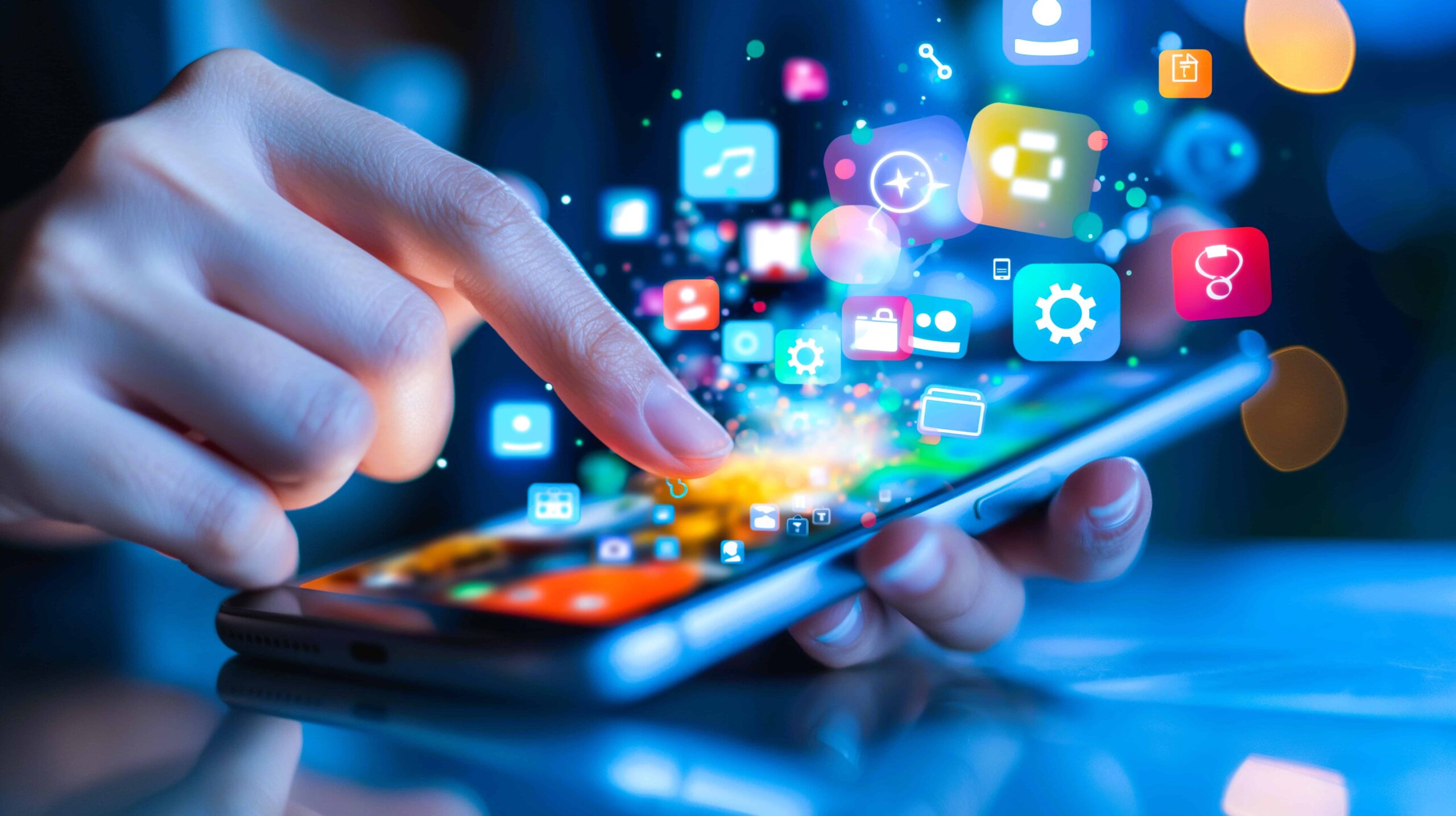The integration of artificial intelligence (AI) into mobile applications has revolutionized the way we interact with technology. The growing popularity of virtual assistants and AI-powered tools has drastically changed the dynamics between users and devices. In this context, tools like ChatGPT not only facilitate communication but also offer a customizable experience for each user.
These applications with artificial intelligence are finding their place in various areas, from health to entertainment. The personalization that these systems offer is a huge attraction, making them indispensable in the routine of thousands of people. With a simple voice command or message, users get instant and relevant answers.
Through technological innovation, we can see a future where human and digital interactions become increasingly fluid. In this article, we will discuss some of the main applications that use AI, such as ChatGPT, and other personal assistants that are changing the way we live and work.
ChatGPT: What it is and how it works
ChatGPT is a language model developed by OpenAI. It uses advanced deep learning methods to understand and generate natural language text. This capability allows ChatGPT to simulate human conversations in a fluid and intuitive way.
The basic workings of ChatGPT involve processing a large amount of textual data. In doing so, the model learns patterns, contexts, and nuances of language. This allows it to provide high-quality responses across a variety of topics.
One of ChatGPT’s key features is its ability to maintain the context of a conversation. This means it can recall previously mentioned information, making the interaction more cohesive and natural. Furthermore, this technology will continue to evolve over time.
ChatGPT is already used in a variety of applications, from customer service chatbots to educational tools. This versatility shows how AI can be integrated into different contexts, always with the intention of improving the user experience.
For industries that require constant communication, such as technical support, ChatGPT excels at increasing efficiency and customer satisfaction. This combination of efficiency and responsiveness is a clear demonstration of the positive impact of AI.
Personal Assistants: A New Era of Convenience
AI-powered personal assistants like Siri, Alexa, and Google Assistant make modern life easier. They help with everyday tasks, from scheduling reminders to searching for information. This comprehensive functionality has transformed the way we interact with mobile devices.
These assistants are designed to understand and respond to voice commands. Using AI allows these systems to learn users’ preferences over time, becoming more accurate and personalized. This aspect is crucial for user satisfaction.
Additionally, personal assistants can now be integrated into home devices. This allows users to control everything from lights to security systems with just one command. This automation makes life more convenient and efficient.
The future of personal assistants looks even brighter with the advancement of AI and machine learning. Interactions are expected to become even more humanized, allowing for an unprecedented level of personalization. This goes far beyond what we know today.
Speech-to-text conversion and understanding emotional nuances are some areas where AI can constantly improve, making the relationship between humans and AI assistants even more interactive and intuitive.
AI Applications in Various Industries
Most industries have already recognized the importance of artificial intelligence. It is being applied in sectors such as healthcare, retail, and education, providing significant innovations. AI-driven digital transformation is not an option, but a necessity.
The healthcare industry, for example, uses AI for more accurate diagnoses and personalized treatments. Data analysis tools can predict diseases before they manifest, improving patients’ quality of life.
In retail, AI algorithms optimize inventory and improve the customer experience. Personalized recommendations increase sales, while chatbots provide 24-hour customer service. This efficiency is a significant competitive advantage.
In education, educational platforms are using AI to adapt learning to the needs of each student. This ensures that everyone has the best learning opportunities, regardless of their starting level.
Automating routine processes across these industries allows companies to focus on more complex strategies and creativity. Artificial intelligence is an indispensable ally for innovation and efficiency.
Smart Education and Learning
Artificial intelligence is transforming education by making learning more accessible and personalized. AI-powered tools are able to adapt content to each student’s learning style. This helps maximize academic performance.
Platforms like Khan Academy and Duolingo use AI to create interactive learning experiences. They analyze student progress and provide additional challenges based on performance. This personalization is a big step toward inclusive education.
Additionally, AI enables large-scale data analysis. This allows educators to identify trends and gaps in learning, enabling precise interventions. Teaching effectiveness is increased through this intelligent use of data.
With the use of educational chatbots, students can ask questions in real time. This continuous interaction is especially useful for those who do not have access to tutors or teachers on a regular basis. Democratizing education is a crucial milestone.
In the long term, AI promises to revolutionize education even further. Virtual courses, team interactions, and assessment systems will be increasingly aligned with the needs of the job market. As a result, education will be more relevant and adaptable.
The Future of AI Interaction
The future of human interactions with artificial intelligence is promising and full of possibilities. Technological advances provide us with more and more tools that make our daily lives easier. The trend is for this integration to become even deeper.
AI applications will become more persuasive and intuitive, becoming almost invisible in everyday interactions. This allows users to focus on their tasks without being distracted by the technology itself. The experience will be naturally fluid.
Personalization will be a central focus, with tools constantly learning and adapting. The result will be a digital environment that responds to human emotion and behavior in a more authentic way. The promising interaction is just beginning.
At the same time, ethical and privacy issues will become increasingly relevant. The responsibility for developing and deploying AI ethically will fall on developers, companies and users. It is essential that this growth is balanced and conscious.
Ultimately, the future of AI engagement is not just about technology, but about the relationships we form with it. This integration must be intuitive, safe, and beneficial for everyone involved. Continuous dialogue will be key.
Conclusion
The integration of artificial intelligence into everyday applications is changing our lives in significant ways. From ChatGPT to personal assistants, innovation is transforming our interactions with technology. These tools offer personalization and efficiency, making them essential allies in our daily lives.
The impact of AI extends across several industries, optimizing processes and creating new educational approaches. The trend is for applications to continue evolving, providing richer and more intuitive experiences. Human interaction with technology will be more fluid and integrated.
Therefore, it is essential to keep up with these changes to make the most of the advantages that AI offers. Being prepared for a digital and connected future is crucial for all segments of society. Innovation and tradition can coexist harmoniously.
The role of artificial intelligence in contemporary society is undeniable. As new developments emerge, it is important to understand how they shape our lives. Being aware of the potential and implications of AI helps create a better future.
The integration of AI is undoubtedly one of the most exciting technological developments of our time. So stay informed and prepare for a world where artificial intelligence is an essential part of our everyday reality.
Trending Topics

Best Travel Apps to Make Your Adventures Easier
Make your travels easier with the best planning, booking and transportation apps. Discover essential tools for every step of your journey.
Keep Reading
Home Sweet Home Luciano Huck: How to Participate
Learn how to participate in Lar Doce Lar with Luciano Huck and transform your home. Discover the requirements and increase your chances!
Keep ReadingYou may also like

Check Your CPF Online: Keep Your Name Clean
Check your CPF online safely and keep your finances up to date. Avoid unpleasant surprises and protect your financial reputation.
Keep Reading
Best Apps to Clean Cell Phone Memory
Discover the best apps to clean your cell phone's memory, freeing up space and optimizing your smartphone's performance.
Keep Reading
